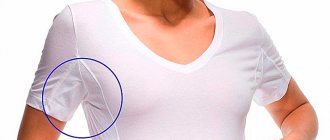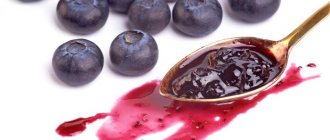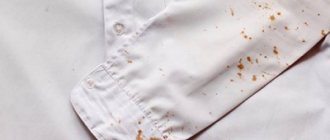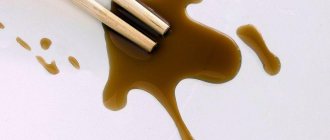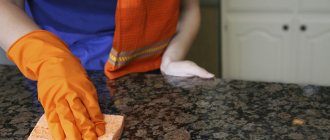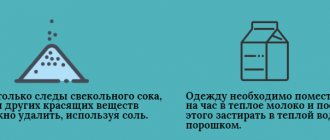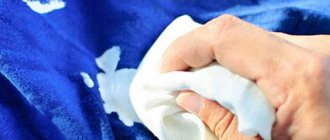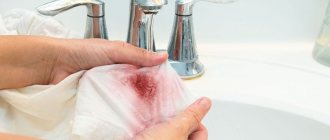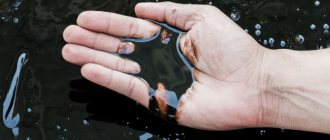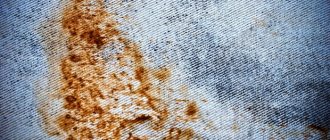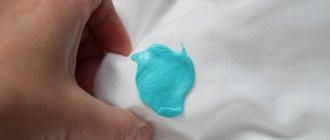If you inadvertently put a cherry stain on your favorite item, then don’t panic. Although such pollution is considered difficult to remove, nothing is impossible. We will tell you how to simply and effectively remove fruit stains from white or colored fabric. Using simple homemade recipes or store-bought medications will give excellent results.
Cleaning white and light-colored fabrics
Modern stain removers based on chlorine and other active substances help remove stains from cherry juice from white clothes and things colored in a monochromatic light shade. But at the same time, chemicals damage the fibers, which worsens the condition and appearance of delicate fabrics and contributes to their rapid wear.
Using traditional methods is a more careful approach to solving the problem. The easiest way is to use boiling water, but it only works on fresh stains. To cope with contamination, the canvas is pulled over some container - a basin, a pan. Traces of juice are poured with a large amount of boiling water.
A fresh stain will be removed quickly, but old stains usually remain in place. To increase the effectiveness of the effect, medical alcohol is added to boiling water. In this case, stains disappear faster, old stains become lighter.
Laundry soap will help remove old traces of cherry juice from light or white clothes. Soak the item of clothing in hot water and rub the stain and the fabric around it well with laundry soap.
The soaped item is left to sit for ten minutes, after which it is poured with boiling water. The item of clothing remains soaked for at least half an hour, after which it is washed by hand.
Hydrogen peroxide is recommended for cleaning delicate fabrics.
Pay attention to the concentration - you need three percent hydrogen peroxide, a more concentrated solution will damage the fabric
The stain solution contains five parts warm water and two parts hydrogen peroxide. Use a tablespoon as a measuring volume - this amount of solution will be enough to remove contamination.
Soak the fabric in the contaminated area with the prepared solution and leave for 30-40 minutes. Then wash the item by hand or in a machine. If you use laundry soap, there is a greater chance that the stain will disappear without a trace.
We stick to simple rules
To fight stains, it is not enough to treat them with a product, because the type of fabric, color and susceptibility to household chemicals is different for each material. Knowing the simple rules for removing stains from clothes, you will return them clean almost free of charge, forgetting about the existence of dry cleaning.
- If you use boiling water, stretch the soiled item over the container, first turning it inside out.
- A red spot with a stain cannot be treated with bleach if the product is colored.
- The stain must be removed with progressive movements, moving from the periphery to the center to prevent spreading (spread).
- Start processing as quickly as possible, because dried juice is more difficult to remove.
- How to bleach white sneakers
- How to remove sweat odor from clothes
Removing stains over time
When a lot of time has passed since the acquisition of the cherry mark, and it was accidentally discovered, there is a chance to remove the spilled juice without leaving a residue. Do not rush to write off the item for scrap and replace it with a new one. With a little effort, you can remove not only significant drips, but also small drops that are sometimes not noticeable at first glance.
Simple products that can be found in every home will help you wash your products and give them a renewed, fragrant look:
- milk;
- food vinegar or essence diluted to 9%;
- lemon;
- soap (preferably laundry soap, other without dyes is also possible);
- petrol.
Hot milk is convenient for removing stains without leaving streaks. First, place the contaminated area in the liquid for a while (10 minutes), then the entire item. They wash it and get a clean product.
Table vinegar (9%) is used as an independent aqueous solution (1:1). The mark is soaked for 30 minutes, then the clothes are washed as usual. Instead of vinegar, hydrogen peroxide works well.
Soap can remove old cherry stains. To do this, you need to wet the area of the material, soap it well and rub. Rinse, cover with soap again, and soak the item for several hours. After washing it will be better than new.
A cotton wool soaked in gasoline, a sponge, and a clean rag are used for wool fabrics, gently wiping, then washing the product with ordinary powder.
Artificial fabrics remove cherry juice faster and easier. For thin, delicate threads (silk, crepe de Chine, nylon) it is better not to use solvents.
When stains remain that cannot be removed using these methods, synthetic bleaches offered by the chemical industry are used. The store will give you advice on the best way to remove the unsightly stain left by the cherry pigment.
Folk, gentle methods will help remove dirt, lightly scent the fabric, almost without damaging it. Save money on expensive stain removers.
Laundry soap without dyes perfectly washes cherries
About people and cherries
It’s a rare person who doesn’t like to drink a glass of cherry juice, eat fresh berries, dumplings, cherries in compote or berry jam.
Everyone knows that it tends to leave unpleasant, too noticeable stains on the festive table and light clothes. And even everyday worries cause housewives to be annoyed by the sight of “washed” T-shirts and sometimes bluish kitchen towels.
The awkward movements of children who spilled compote, the accidental movements of adults who dropped something on their shirts, the splashing of juice from fresh cherries when eating them, or peeling them from seeds for further use in culinary dishes - leave expressive marks on fabrics.
But you can’t refuse the pleasure of trying cherries, because their season is so fleeting. Stains are best avoided. But it is also possible to remove them without a trace.
Cherry juice is a healthy product that leaves behind bright spots
Why are berry stains difficult to remove?
Berry dishes are prepared from fruits that have an intense color. Cherries contain a lot of the pigment anthocyanin. This substance is quite stable and when heated, anthocyanidin aglucone is released. It is responsible for preserving color. That is why stains should not be ironed.
Quite often, small children, and sometimes even adults, get their clothes dirty while eating various fruits.
Note! The pigment dissolves not only under the influence of an oxygen environment, but also from ultraviolet radiation.
If a stain forms on things, try to get rid of it as quickly as possible while it is fresh. A dried stain is much more difficult to remove.
We use household chemicals
To remove cherry stains from clothes, you can use modern household chemicals:
Stain removers such as Vanish or Antipyatin. They may contain surfactants or components based on the active component, and in increased concentrations
But such products should be used carefully, as they can damage the structure of delicate tissues. Be sure to follow the instructions on the stain remover packaging. Bleach can be used to clean white items, since they can remove dyes along with dirt, so they are definitely not suitable for washing colored or dark items. Dishwashing detergents also work well on various stains, including those left by berries and fruits
They contain substances that penetrate the structure of materials and dissolve contaminants. The selected product should be applied to a sponge or soft cloth, after which the problem areas are treated: vigorously rub them, if necessary, leave the composition for a while, and then rinse the product and wash it in the usual way, by hand or in a washing machine. Laundry soap. The alkali contained in it can remove even stubborn and old stains, but it can also damage delicate materials, so you should be careful with this product. To remove a stain, you can simply lather it thoroughly with soap, wait twenty to thirty minutes and start rinsing. But if the contamination is strong and numerous, then you can proceed differently: grate about 50 g of soap and dissolve the resulting shavings in a glass of hot water. Use this concentrated solution to treat stains and add to a basin or washing machine when washing.
How to wash compote from a white T-shirt?
How to wash compote?
- Sprinkle with sparkling mineral water and rub lightly.
- Soak the item in soapy water and rub the stain with laundry soap. ...
- Soak the stained clothing in water with 2 tablespoons of washing powder and 2 tablespoons of ammonia for 45 minutes, then rinse and wash as usual.
25 Feb
2022 Interesting materials:
How to make side footers? How to make headers and footers in Word 2016? How to make the set home command? How to make keyboard shortcuts? How to make a combo chart in Google Sheets? How to make a combo chart in Powerpoint? How to make a conference call on an mts phone? How to make a Zoom conference longer than 40 minutes? How to make a concentrated solution of Fitosporin? How to make a copy of a check to Sberbank online?
Rules of care
In order for white items to last a long time, you need to know the basic rules of care:
- wash and remove stains from white linen in a timely manner, send for storage only in clean form;
- Yellow stains often appear on folded items; it is better to store clothes on hangers;
- Washing for white laundry is not enough; to prevent the item from turning gray, it is periodically bleached;
- Before washing white in the machine, you should rinse it by running the “Rinse” mode;
- White items do not like long-term storage (they turn yellow for no reason), they need to be worn.
For washing, you should choose special detergents for white laundry.
White things make you look younger, refresh, and give a person chic and aristocracy. To do this, the clothes must be in perfectly clean condition. When buying white, you need to remember that you will have to wash things often, so you should stock up on detergents in advance and familiarize yourself with the care instructions.
Share link:
Removing greasy stains
Most often, greasy marks appear on clothes from a variety of foods. To remove them, a lot of means have been invented, which are used depending on the age of the contamination and the composition of the fabric:
- Oily marks that have just been left behind can be easily removed if you immediately rub high-quality washing powder into the contaminated area of the fabric and wash it in hot water.
- If it is not possible to wash the clothes immediately, rub bread crumbs into the greasy mark or sprinkle them with table salt. These substances pull fat from the fabric fibers. Then the clothes are washed in hot water with powder.
- On white items, newly applied grease marks are removed with chalk or talcum powder. The powder is poured onto a dirty area and left for 1-2 hours. Then the clothes are washed in the usual way.
- You can remove old grease stains with a mixture of chalk and gasoline. The mixture is rubbed into the contaminated area on the fabric and left for 3 hours. Then wash the clothes in hot water.
- If the trace of grease is too large, use turpentine. The stain is soaked in this substance and then washed in the usual way.
- Oily traces are removed from colored fabrics with a mixture of equal parts of laundry soap and glycerin. This mass is rubbed into the stain and left for a day. Then it is washed by hand or in a machine in hot water.
- Without washing, you can get rid of the greasy mark by covering it with baby powder and covering it with thin paper. Then iron this area several times with a heated iron.
Important!
Traces of machine oil or other technical fats are removed using the same means as food stains.
General rules
When starting to wash things, you should adhere to a number of requirements, in particular:
- Carefully study the label on the clothing. Not all available washing preparations are suitable for a particular item. Wardrobe items made of wool, linen or viscose require special treatment.
- The sooner you start removing the stain, the easier it is to remove it. As soon as you notice that your clothes are dirty, you should immediately soak them. As long as the cherry mark does not dry out, regular washing will help.
- It is not recommended to use stain removers without first reading the instructions for use. Chemically active agents are not suitable for all materials; as a result, the item may be damaged.
How to remove cherries from clothes using home remedies
Cherry juice contains organic acids; they can be neutralized in an alkaline environment. Most home methods are based on this chemical reaction. How to wash cherries:
- soda;
- hot water;
- salt;
- hydrogen peroxide;
- vinegar and citric acid;
- laundry soap;
- milk.
After using these products, the item should be washed in the usual way: by hand or in the washing machine.
Removing Baking Soda Stains
To remove stains using this method, the soiled material must be wetted and sprinkled with soda. For effect, leave the soda for 15 minutes. Then the remaining substance should be shaken off and the item should be washed in a washing machine with regular powder.
Removing cherry juice with boiling water
Cool boiling water is the easiest and most affordable way to remove contamination from cherry juice. How to wash cherries from clothes with boiling water? Water needs to be boiled in a kettle or saucepan. Hot water from pipes is not suitable for this purpose - its temperature is too low. Next, stretch the soiled item over a sink or basin and pour boiling water over it for a few seconds. The procedure can be repeated if the contamination is not completely removed. This method is suitable for white and light-colored fabrics. Colored ones may fade.
Removing juice with salt
Salt is suitable for different types of fabrics. The principle of removal is the same as with soda. Wet the clothes, wring them out and sprinkle the dirt with salt. After 10 minutes, rinse the fabric with water. Reapply salt if necessary. After such cleaning, it is recommended to wash the clothes in a washing machine with the addition of a stain remover.
Cleaning fabric from cherries with peroxide
This product is not suitable for colored items that fade. But on whites and light ones it helps remove stains very effectively. Hydrogen peroxide should be poured onto the stained area; it should not be pre-wetted with water. Leave for about 30 minutes. Then wash as usual.
Removing stains with vinegar and citric acid
The composition is effective even on thick fabrics, such as jeans. Suitable for colored items
For delicate items - wool and silk - use with caution
To prepare the cleaning composition, you need to mix acetic acid and lemon juice (citric acid diluted with water) in equal proportions. To remove a small stain, one tablespoon of the components is enough. The resulting mixture should be applied with a swab to the contaminated area and rubbed.
Laundry soap for removing cherry juice
This method is suitable for all types of fabrics. Laundry soap can even cope with an old cherry juice stain. To do this, moisten the cloth and rub it generously with a bar of soap. After 10 minutes, soak the clothes in boiling water, without rinsing off the laundry soap, for half an hour. Then wash with powder.
An unusual means for removing stains from cherries - milk
The method is only effective for removing fresh stains. Milk will not harm any types of fabrics; it is suitable for both white and colored fabrics. Washing a large item is problematic - you will need a fairly large volume of milk. Therefore, it is best to use it for children's clothing.
To remove the stain, soak the item in milk for 15 minutes. The stain should disappear. After this, the clothes need to be washed in the machine. It is advisable to use conditioner so that the smell of milk does not remain.
Features of the approach to colored clothing
Before removing traces of juice from fabrics that are prone to shedding, you should test the product on an inconspicuous area of clothing. Only if the color is preserved can the contamination approach be used.
- Salt. It acts very gently, so it can be used when processing delicate matter. Sprinkle a fresh stain generously with crushed salt, and first soften an old stain with water. After a few minutes, shake off the product and add salt again. This can be repeated several times. After this, rinse the fabric in warm water; traces of the berries should completely disappear.
- Citric acid with vinegar solution. An indispensable product for removing stubborn stains, it has a pronounced positive effect even when treating thick jeans. Mix the components in equal proportions. We wet a gauze swab or other white cloth in the resulting mass. We wipe off the dirt, moving from its edges to the center. After processing, the product should be rinsed in cool water and dried in fresh air.
Despite the fact that cherry compote and traces of fresh berries are washed off quite easily and quickly, you need to be careful when consuming them. Using these techniques too frequently can speed up the process of fiber wear, which will ultimately negatively affect the appearance of the products and their functionality.
Cherries are one of the most favorite berries for people of all ages. Their sweet and sour taste, attractiveness, rich color and the presence of simply a huge amount of vitamins captivate both older people and small children. But then, more than once a year, adults are troubled by the question: how to wash cherries from clothes, because if you stain your clothes with the jam or juice of these fresh berries, ordinary washing will not solve the problem. This is especially true for white things.
Old pollution
The appearance of a greasy mark or oily spots on your favorite clothes... Sometimes such a nuisance happens to everyone. This can be technical oil when working in a workshop or vegetable oil used for frying in the kitchen. It's good if you notice the contamination in time. But how to remove an old grease stain from clothes?
Petrol
If you have gasoline, benzene, or trichlorethylene on hand, that's good. These substances will help wash away greasy stains that have already become embedded in the fabric.
Simply apply gasoline (or another of the specified substances) to a sponge or cloth and wipe off the dirt. Before using these chemicals, test them on a hidden area as they may damage the color.
Cleaning old stains at home with gasoline and an enzyme cleaner:
- First, clean the dirt with gasoline.
- After drying, use an enzymatic product. Leave it to act for about 30 minutes.
- Wash the product.
Ammonia and turpentine
This is a good option for removing old dirty marks from a Bolognese jacket, polyester, or raincoat fabric.
Dampen the dirty area with turpentine. Then sprinkle with chalk. After 15 minutes, remove the chalk with a damp cloth. The action will need to be repeated several times. The older the stain, the more repetitions.
Expert opinion Evgeniy Taran
You can also remove stains from fabric with a mixture of turpentine and ammonia (4:1).
Glycerol
Glycerin is a colorless, thick liquid used in the production of cosmetics, perfumes and medicines. It will be useful when it is necessary to remove fat from leather or leatherette
Heat the glycerin carefully, rub it onto the stain, then use alcohol for final cleaning.
How to remove a greasy stain with a mixture of alcohol and glycerin:
- Mix glycerin and alcohol (3:1).
- Apply to the dirty area and leave to act for a short time.
- Clean carefully.
- Rinse and wash the item.
Vinegar
Vinegar will help remove dirt from all materials - from silk, wool trousers, from a winter down jacket or from a sheepskin coat; it is absolutely harmless to velvet fabric and will not spoil a silk dress. Just soak the product in a vinegar solution and wash it after a few minutes.
If the dirt is stubborn, mix 1 tbsp. l. dishwasher detergent, 1 tbsp. l. white vinegar with 2 tbsp. warm water. Leave for 10-15 minutes, then rub with your hands, followed by a dry cleaning solvent, which can be purchased at a hardware store. Once the stain begins to dissolve, soak it with a clean, dry cloth. Repeat until it completely disappears.
When cleaning suede, soak a microfiber cloth (the kind you use to clean your glasses) or other lint-free cloth in vinegar. Gently rub the greasy area until it is removed. After drying, use a special brush to smooth the pile.
Baking Soda and Dishwasher
Combining baking soda and dishwashing detergent is a good way to clean silk. The greasy marks on this expensive material look like they will never be removed. But in most cases this combination works.
How to clean silk with baking soda and dish gel:
- Apply baking soda paste to the dirty area and wipe off after 30 minutes.
- Clean the treated area with dish gel.
- Leave for half an hour again.
- If the stain is washed off, rinse off the product and dry the item.
Adviсe
The algorithm for removing fresh or old stains is no different; however, it is important to remember that old stains are less easily washed off, which means it is necessary to increase the exposure time of the active substance. That is, you need to not only treat the stain with one of the products suggested above, but also leave the product in this form for 10-15 minutes.
It is important not only to remove dirt efficiently, but also not to damage clothing. And for this it is recommended to follow a number of simple but important rules:
How to wash off cherry juice using improvised means
Selection of stain remover
Each stain has its own composition, to remove which you need to find the best home stain remover.
Yellow spots
The reason for the appearance of yellow spots on clothes may be:
- sweat;
- oil (animal or vegetable).
In each case, you need your own stain remover to remove them:
- Sweat is 99% water and 1% organic components, which include lipids, urea, ammonia, and sulfuric acid. They are absorbed into the fibers and change their color. The neutralization/bleaching reaction is carried out using vinegar and soda. Minor stains can be removed by rinsing in an automatic machine by adding 100 milliliters of vinegar. Stubborn stains are treated before washing by rubbing the mixture into traces of sweat. Yellow stains from sweat are removed from silk products with ethyl alcohol. Without vinegar or alcohol, a mixture of hydrogen peroxide and dish soap will help remove yellow underarms.
- Oily traces are removed using glycerin or dishwashing detergent, as well as talc or starch to create a buffer zone. Another method is to apply a 2:2:2 mixture of baking soda, ammonia and dish degreaser. Homemade stain removers are applied to the stain and washed off after 20-30 minutes.
From fruit juices
While the stain is still wet, cover it with table salt, let it dry and shake it off. If traces are preserved, then moisten the contamination with a mixture of table vinegar and citric acid (1:1).
From ink
Glycerin is poured onto the stain and left for 1 hour. Then rinse in warm salted water and wash in an emulsion made from laundry soap. Lines drawn with a ballpoint pen are removed with nail polish remover.
Tea and coffee
A mixture of ammonia and dish soap (ratio 3:1) is suitable. The stain is soaked for 10 minutes in the solution, then rinsed and washed with powder. Fresh tea stains will disappear if they are treated with a slurry of heated glycerin and salt. For black coffee, ammonia is added to the salt. Traces of coffee with milk are dissolved with gasoline from a lighter.
Deodorant
Antiperspirants can leave marks on clothing. On light-colored items, they are removed with an aqueous soda solution (1:1). On dark ones - salt and ammonia. The homemade composition is applied to the stains, left for 15 minutes and washed.
Rust
Fresh rusty stripes and stains are removed using lemon juice and a hot iron. The dirt is moistened with squeezed juice and steamed with a hot iron. The procedure is repeated several times, not allowing the juice to dry completely. Lemon juice should not be used on colored fabrics due to discolouration.
Corrector
The home removal method depends on the composition:
- Water based. Use laundry soap or foam emulsion.
- On alcohol. Similar solvents are used:
- alcohol;
- acetone;
- vodka.
Old stains are wiped with gasoline and white spirit.
